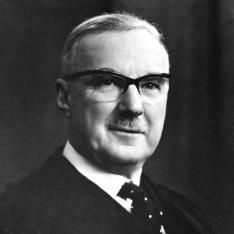
Biography
Sir James Davidson Cameron, or ‘JDS’, as he was known to all, was the antithesis of the flamboyant, ‘prima donna’ consultant so beloved of caricaturists. Short of stature, quietly spoken with a Scots accent, even tempered and slow to judge or criticise he was a man of deep Christian faith. All his life he had been a teetotaller, a non-smoker and keen Bible student, culminating in his Presidency of what was until 2002 known as the Edinburgh Medical Missionary Society (EMMS).
After schooling in Montrose he studied at Edinburgh University, graduating in 1923. In 1926 he was appointed a lecturer in physiology in Sir Edward Sharpey-Schafer’s department leading to his MD (1932) with gold medal for his thesis on renal function. In the intervening years he had been elected Fellow of the Royal College of Physicians of Edinburgh. In 1933 he was appointed consultant physician, Edinburgh Royal Infirmary, holding the position for over 30 years.
Distinguished war service in which he became consultant physician to India Command with the rank of Brigadier, and eventually honorary consultant to the India and Burma Offices (1946) culminated with his being made CBE. On return to civilian life he returned to the Royal Infirmary, continued his didactic lectures now in medicine rather than physiology, and built up a thriving private consulting practice. Between 1960 and 1963 he was a very active President of the Edinburgh College, one of his achievements being the annual St Andrews Day symposium. He will long be remembered for his bringing together the presidents of sister colleges in Australia, Canada and South Africa.
Knighted in 1965, he retired from Edinburgh Royal Infirmary and became adviser in postgraduate medicine to the government of what was then called East Pakistan and, for the next three years, director of the Institute of Post Graduate Medicine in Dacca. He was elected Fellow of the Royal College of Physicians of London, Fellow of the Royal College of Physicians and Surgeons of Glasgow and made a Fellow of the Royal Society of Edinburgh.
His many obituaries paid tribute to his integrity, persuasive manner, pawky humour and consummate skill as a committee chairman when, as one recorded, ‘he exercised a guiding as well as a restraining hand.’
In a profession not given to superlatives, he has been described as ‘a man whose influence for good in the practice of medicine was immense.’
Notable Achievements
Cameron was president of the Royal College of Physicians of Edinburgh from 1960 to 1963.
He was knighted in 1965.
Previously published in the Journal of the Royal College of Physicians of Edinburgh (2011), 41: 282
Author: Derek Doyle.



